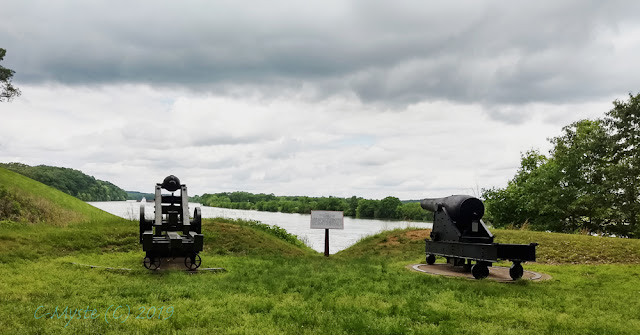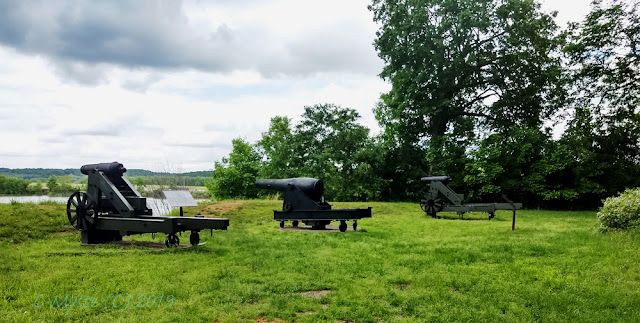We have so far visited two Civil War Battlefields. The second of these was Fort Donelson in Stewart County, Tennessee. Fort Donelson was the site of Grant's first victory and where he garnered the nickname "Unconditional Surrender" Grant.
The driving tour starts at the earthen wall surrounding the main camp. The walls surround about 15 acres and were originally 10 feet high.
All of the cannons in the park are original.
Tom quipped "A Cannon and a cannon."
Now a nesting place for bald eagles, this valley was filled with cabins for the troops.
A reproduction cabin, now home to carpenter bees. Warning signs indicate that the males are curious, the females are angry and aggressive.
The original huts were all burned by the Union/Federal soldiers due to the fore-mentioned measles epidemic which was running rampant among Confederate troops.
_________________________________________________________
A barge on the Cumberland River at its bend at the Upper River Battery
A picture from below with Tom showing the size of the hills.
The Fort Donelson information indicates that the battery here was very successful in fending off attack from the river. The large gun in the middle shot 120 lb balls which severely damaged the ships and forced their retreat.
As we've said several times: the victors write the history books. There are two different takes on the success of this battery. The locals still see it as a resounding success.
Here are excerpts from the New York Times of that February of 1862:
https://www.nytimes.com/1862/02/22/archives/the-siege-of-fort-donelson-full-details-from-our-special.html
During the time that the land forces were engaged, the iron-clad gunboat Carondelet, went up and singly engaged the rebel batteries. She fired 102 shots, and received no great damage in all the tremendous fire to which she was exposed, save in the case of a single shot. This, a monster mass of iron, weighing at least 128 pounds, entered one of her forward ports and wounding eight men in its passage, dashed with terrific force against the breastwork of coal-bags in front of the boilers, and there was stopped. Soon after this she retired from the unequal contest, having covered herself with glory for having so long singly withstood the enormous force of the rebel's entire water batteries.
- And farther down -
The only event of importance that occurred during the day was a heavy engagement between the gunboats and the fort. About 2 P.M. the fort threw a few shells at the transports, but, however, failed in reaching them by about half a mile. Soon after the whole fleet of seven gunboats moved up -- the four iron boats in advance and ahead, the three wooden boats at a discreet distance in the rear. At about a mile the iron boats opened from their bow guns, and were replied to promptly by the fort.
I secured a position about half-way between the boats and fort, a little out of the line of fire, and there for two hours had the pleasure of listening to a concert of the most gigantic order. At first the roar from fort and boats was unbroken for a single instant, so rapid was the firing, while the air high overhead seemed filled with a million of hissings, as the heavy storm of shells tore furiously ahead on their mission of destruction. In about half an hour, the fire from the fort began to slacken, and shortly after was continued from only three guns -- the rest apparently having been silenced by our fire. At this time the boats were within some four hundred yards, and were on the point of using grape-shot, when a shot disabled the steering apparatus of the Louisville, by carrying off the top of the wheelhouse, and knocking the wheel itself into fragments. There was a tiller aft, and this was instantly taken possession of by the pilot -- but he had scarcely reached it, ere the rudder was carried away by a shot from the Taylor. Of course the boat became instantly unmanageable, and swung around, receiving a shot in the wood-work towards the stern, which, I believe, wounded several seamen. Under these circumstances, it was thought best to retire, and accordingly the whole fleet fell back to the position it had occupied in the morning. The most serious damage sustained during the action was from one of those monster 128 pound shots, which passed through a bow-port of the Louisville and dismounted the second gun on the starboard quarter, killing three men and wounding six others. A captain of one of the guns was cut completely in two, and spattered his brains over Capt. DOVE, who stood by him, and otherwise so mangled him that scarcely a resemblance to humanity remained. The same boat also received a shot near the water-line, which, while it did not penetrate the hull, started the timbers, so as to set her leaking badly. During the night, however, all damage was repaired, and this morning she is as ready for active service as ever. The total loss on the Louisville was six killed and eight or ten wounded. One of the other gunboats had some of her woodwork shot away, but was not materially damaged.
The driving tour continues to the site of the CSA outer trenches.
In these trenches was a slaughter of Confederate soldiers by bayonet attack at dawn on February 15th.
One thing I found interesting was a difference in wording. We had always said "The Union" or "Union troops" while in Kentucky and Tennessee they are referred to as "The Federals."
The Dover Hotel became known as "The Surrender House". Here General Grant met with his old friend General Buckner for the formal surrender of Fort Donelson and Dover. The hotel has been restored to its original state.
Here on the Cumberland is where steamboat passengers unloaded and walked up the slope to the hotel. In February of 1862 some 13,000 Confederate prisoners walked down the slope and were loaded and moved to prison camps in the north.
Another NYT excerpt:
The troops were mainly in citizens' clothes, their only military insignia being black stripes on their pants. Many of the officers had the regular gray uniform, while others wore the army blue, the only difference from the United States style being in the great profusion of gold lace.
In conversation with many of the officers and men, I learn that a majority of the Tennessee regiments enlisted for twelve months, and since they have been in service have not received a cent of pay, but have been obliged to defray their own expenses from the beginning. Their hatred of PILLOW and FLOYD is bitter, as it is thought that these worthies deserted them in a most cowardly manner. The feeling was so strong against FLOYD that several of the Confederate soldiers fired at him as he was leaving, and it is asserted by many that he was killed. FLOYD some time since proved himself a thief, and now has shown himself, in addition, a coward.
Last evening and to-day, the troops are being embarked on the transports and sent down the river. What disposition will be made of them I do not know.
The loss of the rebels is not exactly known, but is undoubtedly severe. Every house in Dover was filled with dead and wounded; and from this and other circumstances it is probably not far from the truth to estimate their loss as fully equal to ours, and quite probably greater. The rebels, during the three days, succeeded in capturing quite a large number of National soldiers -- in all, probably from 60 to 100. When FLOYD and PILLOW left, they took all the prisoners with them, and they are now probably caged at Nashville.
I have doubts about the "hatred of Pillow and Floyd." And notice that he mentions the capture of "quite a large number of National soldiers" (60 to 100) but does not enumerate the 13,000 Confederate soldiers.
For a first-hand account written by a Confederate Soldier 50 years post-war visit
https://web.viu.ca/davies/H325%20Civil%20War/Experiences.POW.Confederate.htm
From the Tennessee Encyclopedia
https://tennesseeencyclopedia.net/entries/stewart-county/:
During the Civil War, Union troops, who had occupied the town since the fall of Fort Donelson in 1862, set fire to Dover to prevent the town from falling into the hands of General Nathan Bedford Forrest; only four buildings survived the conflagration.One of the buildings spared was the Dover Hotel.
Another interesting story that the camp host told us was about the One-Man War of Jack Hinson.
https://www.warhistoryonline.com/featured/jack-hinson-a-civil-war-sniper-hell-bent-on-revenge.html
So many stories from the area.



























